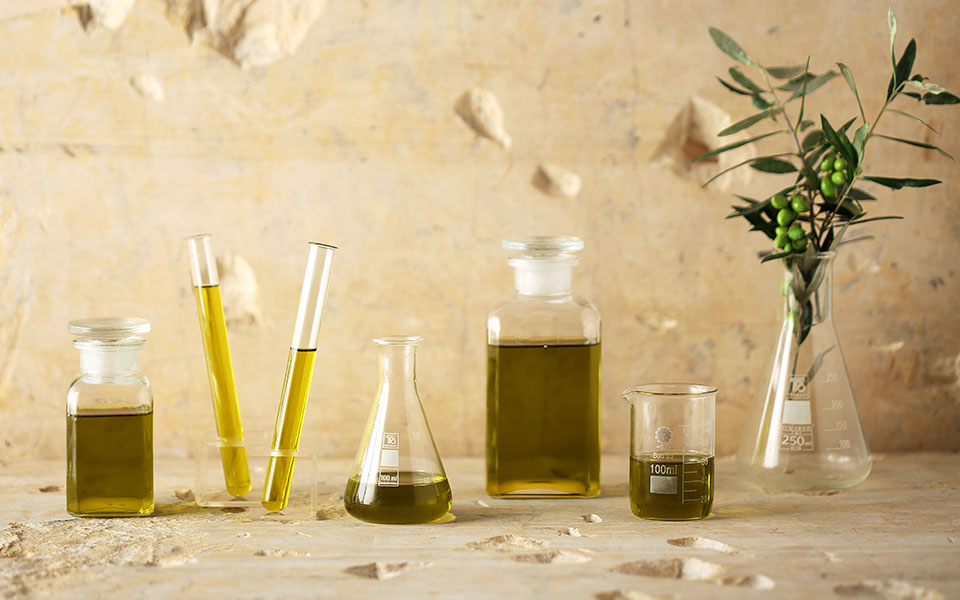The ancient Greeks had it right. Homer, the author of The Iliad and The Odyssey, referred to olive oil as “liquid gold.” Hippocrates, the physician known as the father of Western medicine, called it “the great healer” and prescribed it for 60 medical conditions. Dioscorides, another doctor, was one of the first to recognize that the healthiest olive oils were the fresh oils extracted from certain varieties of unripe olives – a fact recently confirmed by scientists, whose studies have also added to the long list of olive oil’s health benefits.
According to myth, in a competition to become the patron of an as-yet unnamed city, the goddess Athena beat Poseidon when it was judged by the city’s residents that her gift to humanity, the olive tree, was more impressive than the sea god’s not-so thirst-quenching salty spring. Thus the city of Athens acquired its name and its patron goddess, along with the trees that have been prized for their tasty and nutritious fruit ever since.
In real life, according to food historian Mariana Kavroulaki, ancient Greeks “selected the olive tree because it was reliable, long-lasting, and very fertile. Olives were used as food and as fuel; the oil was a basic product in lighting, medicine, diet, and cosmetics, and the export of the oil was of great economic importance.”
“Greeks realized from very early on just how essential olive oil was to both their daily lives and their economy,” bringing them both wealth and good health. In fact, olive oil has played an integral part in the Greek diet and Greek healthcare for millennia.
“Let food be thy medicine and medicine be thy food” – Hippocrates
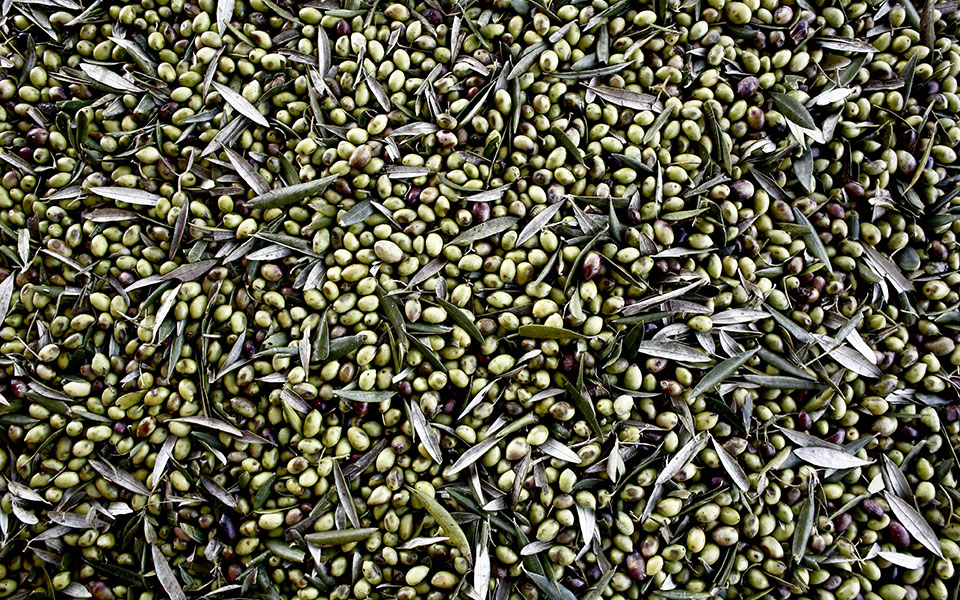
© Getty images/Ideal image
It’s no coincidence that Mediterranean populations tend to live longer and suffer less from heart disease, high blood pressure and strokes than North Americans and northern Europeans. This observation has inspired great interest in the Mediterranean diet, particularly olive oil, one of its main components. Hundreds of studies have explored olive oil’s health benefits over the last six decades, ever since Ancel Keys initiated his famous Seven Countries Study in the 1950s.
Mary M. Flynn, PhD, RD, a Brown University professor and dietician at the Miriam Hospital in Rhode Island, explains that there is a “common misperception that the health benefits of olive oil are due to the monounsaturated fat content,” which is often viewed as being healthier than saturated fat and trans fat. However, olive oil offers far more than that, according to Flynn: “Studies done in animals and in test tubes have shown that the phenols in olive oil have amazing health benefits, such as selectively killing cancer cells, decreasing inflammation as much as ibuprofen will, and inhibiting tumor growth.”
The Amazing Health Properties of Olive Oil’s Polyphenols
In 2012, the European Food Safety Authority (EFSA) approved the following claim: “olive oil polyphenols contribute to the protection of blood lipids from oxidative stress.” University of Athens professor Prokopios Magiatis explains that this “means protection of LDL cholesterol from oxidation and consequently protection from heart attack and stroke.” The EFSA limited the health claim to certain polyphenols, including oleacein and oleocanthal, and to olive oils that contain a particular amount of them.
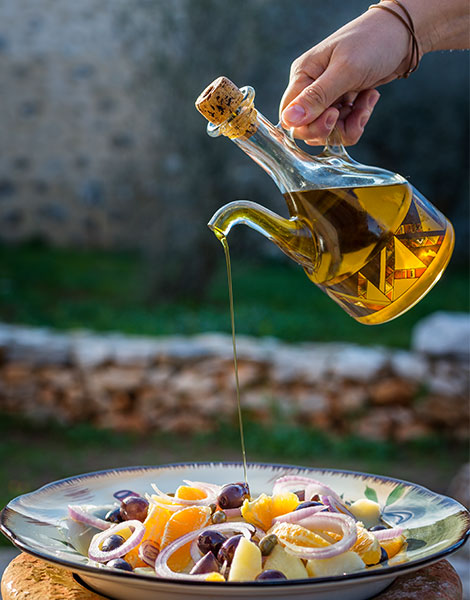
© Perikles Merakos
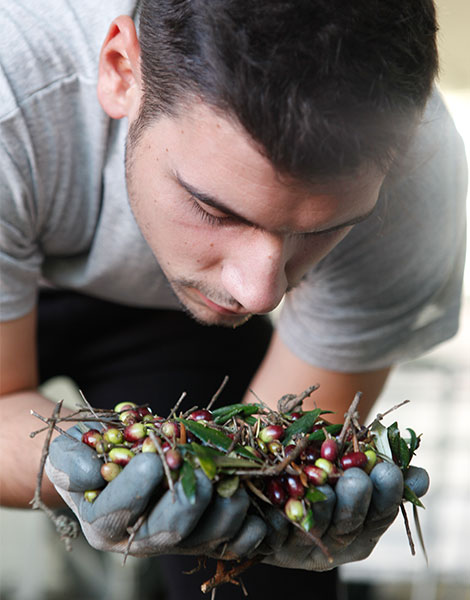
© Katerina Kampiti
We need antioxidants to avoid excessive damage from oxidative stress, which has also been linked to illnesses such as chronic fatigue syndrome, fibromyalgia, diabetes, Alzheimer’s disease, Parkinson’s disease, atherosclerosis and cancer. Scientific studies suggest that some olive oil polyphenols, including oleacein and oleocanthal, can help us avoid this damage and help prevent these diseases.
Much of the recent research on olive oil has focused on the contribution of polyphenols, which are antimicrobial and anti-inflammatory as well as antioxidants. Extra virgin olive oil (EVOO) is the type of olive oil that tends to be richest in polyphenols; it is unrefined, and refining destroys many of the healthy compounds. (The amount and type of polyphenols varies from one EVOO to another, and virgin olive oil also contains smaller amounts of them.) Extra virgin oil is, therefore, recommended for those seeking maximum health benefits.
Oleocanthal, a polyphenol found only in some types of olive oil, has actually been compared to a common medication. One day in 2005, American scientist Gary Beauchamp tasted a freshly pressed EVOO and noticed a peppery stinging sensation in his throat very similar to a feeling he had when consuming a solution of the non-steroidal anti-inflammatory drug ibuprofen. Further investigation led to the groundbreaking discovery that oleocanthal also has similar anti-inflammatory effects to the drug.
This is significant since many diseases, including cancer, heart disease, metabolic syndrome, diabetes, Alzheimer’s and arthritis, are associated with chronic inflammation. High-phenolic EVOO has been shown to reduce the blood clotting and narrowing of arteries that can lead to cardiovascular diseases, and oleocanthal has even killed cancer cells in test tubes, without harming healthy cells.

© Clairy Moustafellou
Greek Olive Oils Are Particularly Healthy
Having studied olive oil from a pharmaceutical perspective for 16 years, Prof Magiatis explains that the combination of Greek olive varieties with Greece’s unique climate and soil type can produce “olive oil with increased levels of specific phenolic ingredients like oleocanthal and oleacein – something that we don’t find often in the major varieties” of other leading olive oil producing countries.
“Moreover,” Magiatis continues, “in Greece, there are numerous olive mills, and the production per farmer is small, so most producers are able to take personal care of the oil they make. For this reason, most of the oil produced is not only extra virgin but also high phenolic.” In other words, Greek extra virgin tends to be especially healthy – so healthy that some Greek entrepreneurs are packaging their extra-high phenolic extra virgin in medicine bottles, while others have enclosed their product in vitamin-like capsules.
Flynn believes the many health benefits of extra virgin olive oil make it “more medicine than food, and it is a delicious medicine.” She finds it “hard to emphasize just one of the many health benefits of olive oil,” but is especially impressed by its ability to improve insulin sensitivity. “This means that use of olive oil daily will make insulin work better… [leading to] lower blood levels of both insulin and glucose” and, consequently, a lower risk of heart disease and cancer of the breast, prostate, pancreas, and leukemia. This is because excess insulin and glucose make the body more susceptible to those diseases.
A recent clinical study went so far as to compare extra virgin olive oil with a statin drug, checking their ability to lower lipids in people with type 2 diabetes. While the statin was more effective, extra virgin had significant effects, without the negative side effects of the drug. Some do worry that consuming even healthy fat such as that in EVOO will lead to weight gain. However, Flynn and others have observed that olive oil can actually help us lose weight and maintain a healthy weight, since the fat in it leaves us satisfied enough to stop eating and keeps us feeling full longer.
It is no coincidence that Mediterranean peoples tend to live longer and suffer less from heart disease, high blood pressure and stroke than North Americans and northern Europeans.
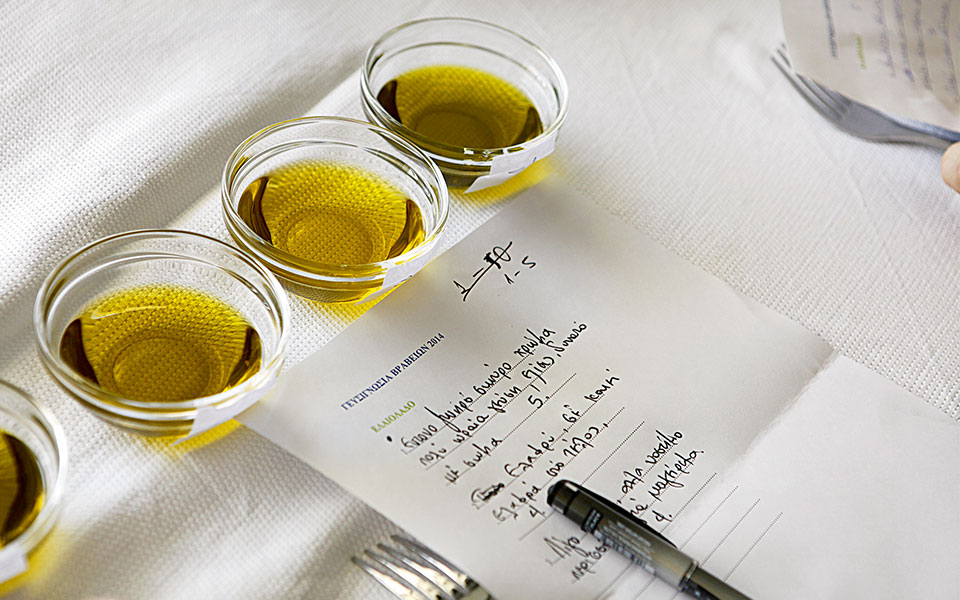
© Katerina Kampiti
Cooking With Olive Oil
Flynn adds that EVOO “is an economical food that makes your meal, and especially vegetables, taste better, and it will improve your health. A meal of two tablespoons of olive oil, vegetables and a starch is much less expensive, and certainly healthier, than one that contains even an average amount of meat.” (Most discussions on the health benefits of olive oil call for two to three tablespoons of extra virgin olive oil per day, in place of other fats.)
Some argue that it’s best to consume olive oil raw, to prevent nutrients being damaged by heat, and it may be true that this is the best way to get the full benefits of extra virgin. On the other hand, extra virgin olive oil may also be the healthiest fat to cook with, especially since preparing certain vegetables with it seems to make them even more nutritious by increasing their polyphenol content. Olive oil also improves our ability to digest and absorb plant carotenoids, which are thought to be anticarcinogenic. Meats, too, can become healthier when marinated and cooked with olive oil, thanks to its antioxidants.
Olive oil’s high smoke point is unlikely to be reached during normal home cooking. Even frying with it may be fine, and preferable to frying in other oils, since a Spanish study conducted over an 11-year period on over 40,000 adults found that regular consumption of foods fried in olive oil did not increase their risk of heart disease.
And that’s not all; rich in vitamin E, an antioxidant that helps boost the immune system, EVOO has also been shown to help decrease the risk of high triglyceride levels, depression, osteoporosis and high blood pressure. As Magiatis reminds us, “used in place of animal fat, [EVOO] is useful for the control of cholesterol levels. This is also an official EU-[and US Food and Drug Administration]-approved health claim.”

